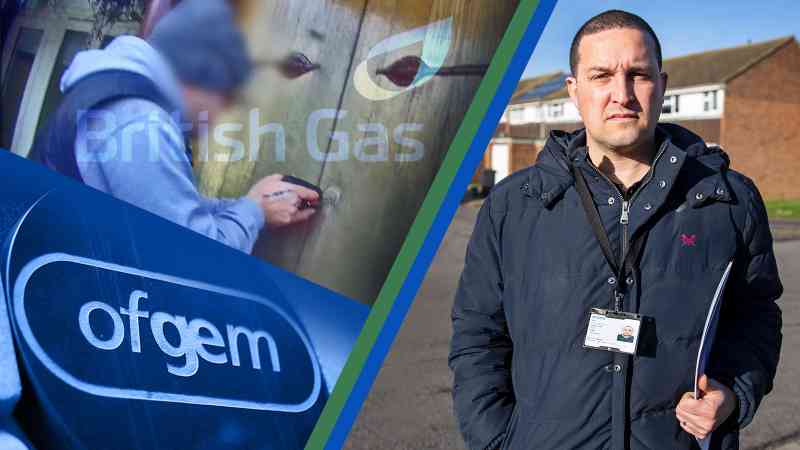Ofgem backs down after threatening The Times over prepaid meters exposé
Britain’s energy regulator has ditched its attempts to force The Times and one of its reporters to hand over confidential personal notes in a row over journalistic independence.
Officials at Ofgem had sent notices to the newspaper and Paul Morgan-Bentley, its head of investigations, asking them to hand over all the reporter’s relevant materials — including journalistic notes and undercover video — relating to an exposé on behaviour at British Gas. The notices included threats of criminal sanctions and unlimited fines.
Last month, The Times published details of an investigation that showed that British Gas sent debt collectors to break into customers’ homes and force-fit pay-as-you-go meters, even when they were known to be extremely vulnerable.
• Exposed: how British Gas debt agents break into homes of vulnerable
The investigation prompted the watchdog to order the company not to break into its customers’ homes until it could prove that it was complying with all its legal obligations.
Ofgem then demanded to see the undercover recordings and the journalist’s “personal notes”. The notices suggested that it was a criminal offence not to comply “without reasonable excuse”.
On Wednesday, lawyers for the newspaper said that it would refuse to comply with the demand for Morgan-Bentley’s notes and other material.
The newspaper responded to the regulator stating that the information requests were unlawful attempts to force the compulsory disclosure of journalistic material.
The Times told Ofgem that its investigation arose after Morgan-Bentley’s public-interest journalism. “It is a serious step to threaten a journalist with criminal sanction and there was no basis in law to do so on this occasion,” the newspaper said.
On Thursday, officials at Ofgem said that the watchdog was “rescinding” its “information request”.
A spokesman for the regulator said: “It was never our intention to impinge potentially on freedom of expression or journalistic integrity.”
• Leading article: The Times will not hand over journalists’ notes to the energy regulator
He added that Ofgem had “initiated enforcement action against British Gas based on The Times’ detailed investigation and specific allegations. This is a complex process requiring extensive information gathering, primary evidence of potential licence breaches and crosschecking as many sources as possible. This is essential to acting in the public interest and protecting vulnerable households”.
The regulator also posted a statement on Twitter on Thursday saying that it was “working with The Times to resolve this issue amicably & in a way that ensures we can do everything possible to protect vulnerable customers . . .”
In a letter to Tony Gallagher, the editor of The Times, Jonathan Brearley, Ofgem’s chief executive, said that his officials “fully respect the laws and principles that protect journalistic integrity, and our intention was never to impinge upon or compromise that freedom”.
He added: “We are sorry if there is anything we have done which has appeared to undermine that.”
The climbdown came after Grant Shapps, the energy secretary, criticised Ofgem for its initial approach to The Times.
He told Sky News on Thursday morning that Ofgem “need to fix the problems that were uncovered and not be pursuing or threatening to pursue journalists who have uncovered these things”.
Shapps said that it was “wrong” for officials to have pursued journalists, adding that “the journalists are merely doing the job of uncovering something which absolutely should not be going on. I have cracked down very hard on that particular scandal to do with prepaid meters. I expect the regulator to do the same job.”
Ruth Anderson, the CEO of Index of Censorship that campaigns for freedom of expression, said Ofgem’s decision to pursue The Times had been an “appalling development”. She said: “Ofgem should apologise without delay to both the journalist concerned and to your newspaper or face a parliamentary inquiry.
“We would expect these actions in a despotic regime, not in the UK in 2023.”
In a leading article, The Times said that “the intimidation of journalists by the state is nothing new. But this behaviour is misguided and unacceptable.
“Having failed to rein in British Gas itself, Ofgem is now using statutory powers to attack the newspaper that did the job for it. The request in itself infringes journalistic privileges.”
The pay-as-you-go meters have been more expensive to run and cut off families if they cannot afford to top up.
While working undercover, Morgan-Bentley discovered that families targeted this winter included a single father with three children, the mother of a four-week-old baby and a woman in her fifties known to have severe mental health problems. As a result of the reports, all UK energy companies have been suspended from force-fitting prepayment meters until they agree to a legally enforceable code of practice.
Ofgem began an investigation into practices at British Gas and Arvato Financial Solutions, the third-party debt collection agency it used. As part of its inquiry, Ofgem also sent letters this month to The Times and Morgan-Bentley.
The reporter was asked to “produce to the authority all the documents in its custody or control”, including papers the regulator should have been able to obtain from British Gas and Arvato.
Centrica has apologised for its agents’ conduct and said protecting customers was “an absolute priority”. Arvato said it “acts compliantly in accordance with the regulatory requirements”.






